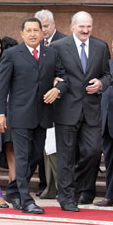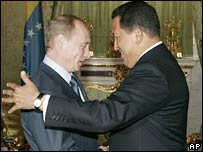The reports of international observers will be confidential
CNE will discuss and approve the rules governing voting center members and vote counting methods on Friday. The date for signing the services contract of the recall vote and the possibility of setting up fingerprint-reading machines in the electoral centers will be considered on Monday
The National Electoral Council (CNE) approved the rules for international observation, which states that the final reports of the international missions will be confidential. They also lay down that observers cannot make declarations and must sign a document whereby they commit themselves to observe the rules issued by the electoral authorities.
The article from the rule draft presented by the CNE's legal adviser, Andrés Brito, that gave precedence to Latin American electoral organization as observers was eliminated.
This modification allows the CNE to consider issuing invitations to the Carter Center, the Organization of American States (OAS), and the Centro de Asesoría y Promocion Electoral, Capel, as well as to the presidents of electoral courts in the continent, to act as guarantors of the presidential recall vote. Additionally, the creation of a follow-up committee, which will see that the rules for the international observation be obeyed, was approved.
Written notification
When the final voter list is approved and published by the CNE's directorate next July 24, the exact number of automated and manual electoral centers for the referendum would be known.
Electors "relocated" by the CNE will receive a letter informing them about the electoral centers where they should vote. Preliminary figures by the National Electoral Board suggest that 800-1,000 new voting centers will be created. The CNE has approved a budget of $80,931 for this process.
Military vote
The CNE's directorate unanimously ratified the right of the military forces to vote in the presidential recall vote. The directors will evaluate on Friday the rules for vote counting and members of the electoral centers. On Monday they will discuss the possibility of setting up fingerprint-reading machines and satellite transmission of the referendum outcome.
Please comment responsibly:
|
Absolutely Impartial
These are the faces of absolutely impartial "referees":
 Carrasquero with the Maisantas, and
Carrasquero with the Maisantas, and Carrasquero & Rodriguez with the CD.
Carrasquero & Rodriguez with the CD.Any wonder we distrust these guys?
Rodriguez looks positively uncomfortable in the meeting with the CD. ¿Shoegazing, anyone?
Please comment responsibly:
|
Likely voters
[Well, I'm in Perugia now - easily the most beautiful city you've probably never heard of - but more to the point, a place where I can sneak into the University computer labs and blog without worrying about the clock running. So I think I'll blog a bit while I'm here.]
I'll start with a note on the Datanalysis poll. The poll actually worried the hell out of me. The 57% YES number is predictable and probably right and consistent with past polling. That's not the problem, the problem is with the Likely Voters number.
Datanalisis has it at 65%. But this they arrive at by asking people if they plan to vote. As everybody knows (or should know) this can be a real concha-de-mango. Answers to this question, in the past, have always OVERestimated the number of voters. Sometimes by a lot. People are embarrassed to admit to a pollster that they don't intend to vote, this is a well-understood phenomenon. Therefore, the 65% figure is probably too high. Hard as it is for people like us to believe, there are still millions of Venezuelans who simply don't care about politics one way or another. This is a fact, and we need to just deal with it.
So as a note to those of you who think there'll be 8 million YES votes. Folks, aterrizen! There just won't be that many voters! Besides, a third of the country is Chavista, even Datanalisis knows that!
So, for what it's worth, I'll give you my numbers: 56% Yes, 59% turnout. The YES side wins, but not by much.
Please comment responsibly:
|
Last poll by Datanalisis
Bloomberg reports on the last poll by Datanalisis ...
Venezuela Chavez Would Lose Recall Vote, Poll Finds (Update1) June 23 (Bloomberg) -- Venezuelan President Hugo Chavez would lose a recall vote scheduled for Aug. 15, according to a poll taken last month by independent Datanalisis polling agency.
Interviews of 1,300 Venezuelans, done in person between May 10 and May 19 in eight regions, found 57.4 percent of people who said they were likely to vote want Chavez removed, while 42.6 percent would vote for him to stay as president. The poll has a 2.7 percent margin of error.
(more)They also say that, with a 65% of people expressing their intention to vote, 4.64 million would say YES. Much more than the 3.76 million threshold to revoke Chávez. The research was carried out before the 'reparos'.
Please comment responsibly:
|
Arriechi declares himself in disobedience
A few hours after the Constitutional Chamber of the Supreme Court of Justice (TSJ) approved his dismissal in a ruling that ratified a decision of the National Assembly, Magistrate Franklin Arriechi, president of the Cassation Chamber and first Vice President of the TSJ, declared himself in civil disobedience and announced that he will remain in office.
"Under the law, I have not resigned, I have not been dismissed in accordance with the Constitution and my tenure is not recallable, that is, I can lawfully remain in my post," said Arriechi, who described the decision as a political revenge.
The magistrate also said that Venezuela "is experiencing a constitutional breaking point," which is why he is disowning his dismissal, the new Law of the Supreme Tribunal of Justice and the authority of the National Assembly to fire him.
what shall we do with the bendito article 350 of the constitution?.
Please comment responsibly:
|
Ur-Fascism
I was looking for the original version of this on the internet, and came across of only this abridged version. The original was published, according to my source, in the New York Review of Books in 1995, and then an abridged version was released in Utne Reader, the famous liberal magazine, during the same year. It was later included in Eco's "Five Moral Pieces" in 1997. The essay is based on a lecture given by Eco in the wake of the Oklahoma bombings.
Eco analyzes and delivers for our consumption 14 features that are commonly found in fascistic movements throughout the world and I just thought it'd be interesting to analyze chavismo using these 14 features as a checklist of sorts.
An interesting fact I came across when looking for this piece on the internet is that a different version of those 14 features was released on the Internet by a political scientist named Lawrence Britt on the Free Inquiry Magazine, and it is often cited by liberals, radicals, anarchists and punks, with no reference to Eco. The points structure mirrors almost exactly that of Eco's but it is converted into political science jargon.
If you Google it you will get the same account of Dr. Britt doing his thing and coming up with these 14 common features, yet in his piece he never mentions Eco's essay.
Another nice touch in this issue is that even chavistas have used this piece. Yet, they choose to illustrate their translation of Britt's, not Eco's piece with, Ta-daaa, a picture of George W. Bush.
Talk about the "brizna de paja en el ojo ajeno".
Anyway, my fellow "Quico orphans", here it is:
Eternal Fascism:
Fourteen Ways of Looking at a Blackshirt
By Umberto Eco
Writing in New York Review of Books, 22 June 1995, pp.12-15. Excerpted in Utne Reader, November-December 1995, pp. 57-59.The following version follows the text and formatting of the Utne Reader article, and in addition, makes the first sentence of each numbered point a statement in bold type. Italics are in the original.
For the full article, consult the New York Review of Books, purchase the full article online; or purchase Eco's new collection of essays: Five Moral Pieces.
In spite of some fuzziness regarding the difference between various historical forms of fascism, I think it is possible to outline a list of features that are typical of what I would like to call Ur-Fascism, or Eternal Fascism. These features cannot be organized into a system; many of them contradict each other, and are also typical of other kinds of despotism or fanaticism. But it is enough that one of them be present to allow fascism to coagulate around it.
1. The first feature of Ur-Fascism is the cult of tradition.Traditionalism is of course much older than fascism. Not only was it typical of counterrevolutionary Catholic thought after the French revolution, but is was born in the late Hellenistic era, as a reaction to classical Greek rationalism. In the Mediterranean basin, people of different religions (most of the faiths indulgently accepted by the Roman pantheon) started dreaming of a revelation received at the dawn of human history. This revelation, according to the traditionalist mystique, had remained for a long time concealed under the veil of forgotten languages -- in Egyptian hieroglyphs, in the Celtic runes, in the scrolls of the little-known religions of Asia.
This new culture had to be syncretistic. Syncretism is not only, as the dictionary says, "the combination of different forms of belief or practice;" such a combination must tolerate contradictions. Each of the original messages contains a sliver of wisdom, and although they seem to say different or incompatible things, they all are nevertheless alluding, allegorically, to the same primeval truth.
As a consequence, there can be no advancement of learning. Truth already has been spelled out once and for all, and we can only keep interpreting its obscure message.
If you browse in the shelves that, in American bookstores, are labeled New Age, you can find there even Saint Augustine, who, as far as I know, was not a fascist. But combining Saint Augustine and Stonehenge -- that is a symptom of Ur-Fascism.
2. Traditionalism implies the rejection of modernism.Both Fascists and Nazis worshipped technology, while traditionalist thinkers usually reject it as a negation of traditional spiritual values. However, even though Nazism was proud of its industrial achievements, its praise of modernism was only the surface of an ideology based upon blood and earth (Blut und Boden). The rejection of the modern world was disguised as a rebuttal of the capitalistic way of life. The Enlightenment, the Age of Reason, is seen as the beginning of modern depravity. In this sense Ur-Fascism can be defined as irrationalism.
3. Irrationalism also depends on the cult of action for action's sake.Action being beautiful in itself, it must be taken before, or without, reflection. Thinking is a form of emasculation. Therefore culture is suspect insofar as it is identified with critical attitudes. Distrust of the intellectual world has always been a symptom of Ur-Fascism, from Hermann Goering's fondness for a phrase from a Hanns Johst play ("When I hear the word 'culture' I reach for my gun") to the frequent use of such expressions as "degenerate intellectuals," "eggheads," "effete snobs," and "universities are nests of reds." The official Fascist intellectuals were mainly engaged in attacking modern culture and the liberal intelligentsia for having betrayed traditional values.
4. The critical spirit makes distinctions, and to distinguish is a sign of modernism.In modern culture the scientific community praises disagreement as a way to improve knowledge. For Ur-Fascism, disagreement is treason.
5. Besides, disagreement is a sign of diversity.Ur-Fascism grows up and seeks consensus by exploiting and exacerbating the natural fear of difference. The first appeal of a fascist or prematurely fascist movement is an appeal against the intruders. Thus Ur-Fascism is racist by definition.
6. Ur-Fascism derives from individual or social frustration.That is why one of the most typical features of the historical fascism was the appeal to a frustrated middle class, a class suffering from an economic crisis or feelings of political humiliation, and frightened by the pressure of lower social groups. In our time, when the old "proletarians" are becoming petty bourgeois (and the lumpen are largely excluded from the political scene), the fascism of tomorrow will find its audience in this new majority.
7. To people who feel deprived of a clear social identity, Ur-Fascism says that their only privilege is the most common one, to be born in the same country.This is the origin of nationalism. Besides, the only ones who can provide an identity to the nation are its enemies. Thus at the root of the Ur-Fascist psychology there is the obsession with a plot, possibly an international one. The followers must feel besieged. The easiest way to solve the plot is the appeal to xenophobia. But the plot must also come from the inside: Jews are usually the best target because they have the advantage of being at the same time inside and outside. In the United States, a prominent instance of the plot obsession is to be found in Pat Robertson's The New World Order, but, as we have recently seen, there are many others.
8. The followers must feel humiliated by the ostentatious wealth and force of their enemies.When I was a boy I was taught to think of Englishmen as the five-meal people. They ate more frequently than the poor but sober Italians. Jews are rich and help each other through a secret web of mutual assistance. However, the followers of Ur-Fascism must also be convinced that they can overwhelm the enemies. Thus, by a continuous shifting of rhetorical focus, the enemies are at the same time too strong and too weak. Fascist governments are condemned to lose wars because they are constitutionally incapable of objectively evaluating the force of the enemy.
9. For Ur-Fascism there is no struggle for life but, rather, life is lived for struggle.Thus pacifism is trafficking with the enemy. It is bad because life is permanent warfare. This, however, brings about an Armageddon complex. Since enemies have to be defeated, there must be a final battle, after which the movement will have control of the world. But such "final solutions" implies a further era of peace, a Golden Age, which contradicts the principle of permanent war. No fascist leader has ever succeeded in solving this predicament.
10. Elitism is a typical aspect of any reactionary ideology, insofar as it is fundamentally aristocratic, and aristocratic and militaristic elitism cruelly implies contempt for the weak.Ur-Fascism can only advocate a popular elitism. Every citizen belongs to the best people in the world, the members or the party are the best among the citizens, every citizen can (or ought to) become a member of the party. But there cannot be patricians without plebeians. In fact, the Leader, knowing that his power was not delegated to him democratically but was conquered by force, also knows that his force is based upon the weakness of the masses; they are so weak as to need and deserve a ruler.
11. In such a perspective everybody is educated to become a hero.In every mythology the hero is an exceptional being, but in Ur-Fascist ideology heroism is the norm. This cult of heroism is strictly linked with the cult of death. It is not by chance that a motto of the Spanish Falangists was Viva la Muerte ("Long Live Death!"). In nonfascist societies, the lay public is told that death is unpleasant but must be faced with dignity; believers are told that it is the painful way to reach a supernatural happiness. By contrast, the Ur-Fascist hero craves heroic death, advertised as the best reward for a heroic life. The Ur-Fascist hero is impatient to die. In his impatience, he more frequently sends other people to death.
12. Since both permanent war and heroism are difficult games to play, the Ur-Fascist transfers his will to power to sexual matters.This is the origin of machismo (which implies both disdain for women and intolerance and condemnation of nonstandard sexual habits, from chastity to homosexuality). Since even sex is a difficult game to play, the Ur-Fascist hero tends to play with weapons -- doing so becomes an ersatz phallic exercise.
13. Ur-Fascism is based upon a selective populism, a qualitative populism, one might say.In a democracy, the citizens have individual rights, but the citizens in their entirety have a political impact only from a quantitative point of view -- one follows the decisions of the majority. For Ur-Fascism, however, individuals as individuals have no rights, and the People is conceived as a quality, a monolithic entity expressing the Common Will. Since no large quantity of human beings can have a common will, the Leader pretends to be their interpreter. Having lost their power of delegation, citizens do not act; they are only called on to play the role of the People. Thus the People is only a theatrical fiction. There is in our future a TV or Internet populism, in which the emotional response of a selected group of citizens can be presented and accepted as the Voice of the People.
Because of its qualitative populism, Ur-Fascism must be against "rotten" parliamentary governments. Wherever a politician casts doubt on the legitimacy of a parliament because it no longer represents the Voice of the People, we can smell Ur-Fascism.
14. Ur-Fascism speaks Newspeak.Newspeak was invented by Orwell, in Nineteen Eighty-Four, as the official language of what he called Ingsoc, English Socialism. But elements of Ur-Fascism are common to different forms of dictatorship. All the Nazi or Fascist schoolbooks made use of an impoverished vocabulary, and an elementary syntax, in order to limit the instruments for complex and critical reasoning. But we must be ready to identify other kinds of Newspeak, even if they take the apparently innocent form of a popular talk show.
* * *
Ur-Fascism is still around us, sometimes in plainclothes. It would be so much easier for us if there appeared on the world scene somebody saying, "I want to reopen Auschwitz, I want the Blackshirts to parade again in the Italian squares." Life is not that simple. Ur-Fascism can come back under the most innocent of disguises. Our duty is to uncover it and to point our finger at any of its new instances ? every day, in every part of the world. Franklin Roosevelt's words of November 4, 1938, are worth recalling: "If American democracy ceases to move forward as a living force, seeking day and night by peaceful means to better the lot of our citizens, fascism will grow in strength in our land." Freedom and liberation are an unending task.
Umberto Eco (c) 1995
P.S.: If anyone of you can find a full translated version please let me know, I'd be glad to replace it.
P.S.: Alex kindly came through and found the full version for us. Thanks, Alex.
Please comment responsibly:
|
Breaking News: Arrieche will be Arrecho tonight
According to informal sources within the TSJ, Franklin Arrieche's "Amparo Constitucional" from the 'administrative' act that removed him from office fro supposedly having cheated in his application to the post of TSJ magistrate was declared non-applicable by the Constitutional Hall of the TSJ.
The "Ponencia" was penned by Jesús Delgado Ocando and approved with the vote of Iván Rincón's deputy, Magistrate Carmen Zuleta. The other approving Judge was Jesus Eduardo Cabrera.
In approving this ponencia which denies Arrieche's constitutional rights, they have in effect discovered a new law doctrine: Law is applied retroactively EVEN if it is, as it is in this case, applied in detriment of the individual. Thus, a political part with a 2 person majority can in effect remove any one Magistrate they don't like. Call it Legal Science-Fiction, I call it pure fascism.
Please comment responsibly:
|
Other perverse forms of political cronyism
In another perverse twist of the chavista cultural policy machine, the National Literature Prize was 're-assigned' to Carlos Noguera after the original winner for this year declined it over the intended 'hijacking' of the prize-winner's political allegiances by the CONAC "intelligentsia".
The original winner, José León Tapia, declined the prize and its money award after he was asked to sign a "National Literature Prize Acceptance Affidavit". He made some observations to the conditions and rules regarding the awarding of the prize on a letter, dated March 11th, to now-Minister-of-Culture and PPT party member Architect Francisco "Farruco" Sesto. Tapia sort of refused to attend the ceremony because of medical reasons and because he seemed to suspect a political intention behind the awarding of the prize.
Sesto, then Miguel Márquez, were commissioned to award the prize in situ, in Barinas, the home of Tapia. Eventually Tapia declined the prize altogether citing ?personal and conscience motives? on a letter dated April 14th.
The newly appointed prize winner, Carlos Noguera, heads the Monte Avila Editores Latinoamericana publishing house, our state owned editorial house, which had a long history of political independence since it was founded in the seventies. Noguera is, to put it bluntly, not very independent from the chavista cultural machine. Under his watch, Monte Avila workers have been harassed over 'ideological' issues.
Anyway, it seems rather sad and pathetic to be awarded a prize under those circumstances. If Tapia did not want the prize, if he declined it, it should have remained like that. Award it next year. But this seems odd behavior, to say the least.
Please comment responsibly:
|
President Carter's Trip Report on Venezuela
Some Excerpts from:
President Carter's Trip Report on Venezuela, May 29-June 1, 2004
By Jimmy Carter
4 Jun 2004
The Carter Center has been deeply involved in Venezuela election processes for the past six years, having monitored the contest for president in December 1998 in which Hugo Chavez was elected ...
... At the request of the government and opposition forces, we joined the Organization of American States in a sustained effort to mediate between the major political groups. Early in 2003 I went to Caracas, met with the president and his adversaries, and spelled out two options for resolving the conflict, both of which complied with provisions of the constitution. In May of that year, we helped to negotiate a pact based on one of the options, which would permit the opposition to seek signatures of 20 percent of the registered voters (2,436,000)...
... Following the collection of 3,477,000 total signatures, the basic differences persisted, and the CNE accepted 1,911,000 of them as legitimate, rejected 375,000 as invalid ? and the CNE also decided that previous confirmed signers could withdraw their names. The Carter Center and the OAS deployed approximately 100 observers throughout the nation, coordinated by Rachel Fowler, with Dr. Jennifer McCoy the leader of our delegation and Francisco Diez as our in-country representative. OAS Secretary General Gaviria and I returned to Venezuela to monitor this "reparo" procedure ...
... On arriving in Caracas on Saturday, May 29, we had a thorough briefing from the OAS and Carter Center staff, and learned that there was a strong turnout on Friday, the first day, with about 360,000 names having been confirmed and 35,000 withdrawn ...
... He (Chávez) assured us that he was completely reconciled to participating in the recall referendum if the 20 percent level of signatories is reached. I had heard that he might resign from office and call for an election within 60 days, when he could claim that only 20 percent of the voters opposed him and run again for office against what would probably be a fragmented opposition. He completely discounted this possibility...
...They (the five members of CNE) assured us that the CNE would not resort, as in the past, to searching for technicalities on which to base disqualifications of citizens' preferences. In fact, at every voting site the original and four copies of each day's report (acta) are signed and certified, and the CNE, the government, the opposition, Chavez's political supporters and we international observers all receive identical documents. In a final analysis, there should be no dispute about the total count ...
... Our next meeting was with the chief justice of the Supreme Court, who assured us in eloquent terms of his objectivity and commitment to preserving the constitutional and legal premises on which the political life of Venezuela will be preserved. He also assured us that legal appeals on the recall process would not delay or suspend preparations for an eventual recall vote, unless the allegations were extremely grave ...
... Our observer teams returned from throughout the country and reported their experiences. A number of voters were turned away because of cedula (ID card) technicalities, and some who withdrew their names claimed to have been pressured by the government to do so, but the overall process was peaceful and orderly ...
... When Dr. McCoy, Dr. Diez, and I met with President Chavez for supper, we described the situation to him, he called Carrasquero, and a meeting was scheduled for the following morning. We gave the president our figures (about 650,000), which showed a margin of about 125,000 requiring a referendum ...
(The full document)Perhaps it is a bit late, but I think it is still a good reading.
Please comment responsibly:
|
Turmoil and Tear
Sobre desmadres y desgarramientosby Federico VegasI miss Pablo Antillano?s articles on Todo en Domingo.
I read one on water leaks that still resounds in my nights of insomnia. He once wrote something on the December 2002 strike. Based on the famous judgment by king Solomon, he described "how the government cusp on one side and the opposition 'super-cogollo' on the other, had preferred to divide the boy (the nation, the fatherland, the county, the people) and kill him, instead of finding a truly wise way out."

Of this case, which took place in Jerusalem, versions better adjusted to our times. I remember a story called "The Caucasian Chalk Circle" by Bertolt Brecht. In this second example, judge Dollinger hears two women out, Ana Otterer and Mrs. Zingli. Both claim to be the child?s mother. The judge ordered a circle to be drawn on the ground with chalk. The he said: "For this test, I've been inspired by a very old book."
 Bertolt Brecht
Bertolt Brecht"Both women should pull the boy by a hand. The one who manages to pull the boy out of the circle will be the one that feels a stronger love?. With a violent pull, Mrs. Zingli yanked the boy out of the circle made of chalk, while Anna looked bewildered and aghast. It was then, Dollinger knew who was the true mother.
 The Caucasian Chalk Circle.
The Caucasian Chalk Circle.Antillano's allegory was valid in its intention, but forgot to place one of the most important characters in the story. Antillano presented a kind of tie in guilt between two equally aggressive mothers, and it is dangerous to use the implications of an ancestral tale only hallways. In Jerusalem and Augsburg, there is a mother who yields and a wise man that would not have allowed the ripping.
He might not have been interested then in establishing whether the true mother was either the opposition or the government, but it was certainly convenient to show the absolute absence of Solomon in the Venezuelan example, and establish who should play that role.
When we elect a President we have to keep in mind that undying judgment, which in words of Antillano, ?we carry planted in some part of our psyche and it is revealed, when we are confronted with dilemmas of justice, credibility, love, sacrifice.
Each new Solomon must redefine and redimension the conflicts of his time to grant us that justice, allow us that credibility, spread that love and make sense of our sacrifices.
In a country, where even the most officialist vision recognizes the existence of two antagonist halves preparing for a cruel struggle, a sane president should understand that, whether he likes it or not, he is the guide of both parts, and should be able to bring concord and harmony to his nation.
Our President, who has a bigger responsibility in this task, incarnates more and more fanaticism a hysterical mother who carries a child of dubious health. During the strike, he announced the firing of 18000 workers with the same fruition Marta Colomina describes an oil leak. Now he has declared himself in battle, using as generals those who should occupy themselves in performing a fair and effective government duty, and the money of all Venezuelans. He insists in confronting the tragedy of a torn country with a badly disguised smile, threats and mockery, even to the proposals of some opposition members who propose taking of his government work worthwhile initiatives.
To measure his respect to those who oppose him it suffices with thinking what kind of argument was offered to those who changed their signatures in just a few months, and his public and notorious reproaches to those who failed to achieve more ?convincements?.
The paradox is he started out by uniting the country with the same illusion, and then he started methodically dividing what he had united, until he made irreconcilable. An you can no longer speak of minorities and ?super-cogollos?. It?s difficult to find in our history anyone more apt for discord, for impenitent, denigrating and increasingly unfair aggression. Offering as only compensation the liberty to receive them.
It is one thing not to agree, and another to detest. He, especially with his words, has structured visceral loves and repulsions. His ambiguous refrain about his role until 2021, is perhaps his most painful and gomecist slogan. He mocks a Chavismo without Chávez, when that should be the proud legacy of a democrat after five years of rule.
The spirit of the referendum, points towards finding a solution to this state of turmoil and tear, not only to measure its proportions.
The objective of the constituyentes was to find a medium to let the governor of his great ineptitude for harmony and the need to find an alternative.
But justice has wise ways of operating: our president has been enforcing, with his unending yanking, our ability of integrating, to oppose him with a force that is calm and harmonious, plural and democratic, peaceful and brave, and with God's help, salomonic.
© 2004. CA Editora El Nacional.
Todos Los Derechos Reservados
Please comment responsibly:
|
Court-Packing in Venezuela
FindLaw columnist and human rights attorney Joanne Mariner notes an interesting parallel between American history and Venezuelan current events.
Court-Packing in VenezuelaBy JOANNE MARINER
----
Monday, Jun. 21, 2004
In this country, decades ago, President Franklin D. Roosevelt once tried to remake the U.S. Supreme Court. Frustrated by court rulings that had struck down progressive social legislation, FDR proposed a bill that would have allowed him to name six new justices to the Court.
FDR's plan failed and his court-packing strategy was discredited. Although U.S. presidents subsequent to him have disagreed strongly with some of the Supreme Court's rulings, their ability to capture seats on the Court is limited. Rather than reconfiguring the Court in one fell swoop, they must proceed member by member, as justices die or leave voluntarily.
(More)
Please comment responsibly:
|
Just to keep the ball rolling...
[
Sorry guys, I've been busy killig tigers (that is how we call odd jobs here, to be clear with non Venezuelans: I'll never harm any feline) and have had not much time to breath, let's forget about archetypal reflection... but here goes a little pill.]
Roger Rondón, a deputy who is about to jump the fence and side with the opposition, said today that El Palito, Venezuela's most important refinery, is practically kaput. In his words, the gas is transported there from Amuay and other refineries, and then embarked as if it had been produced in El Palito. Who will pay for this... I mean, besides us?
Please comment responsibly:
|






 Chavez Reelection Blog: Katy documents the government's use of public resources for Chavez's partisan advantage.
Chavez Reelection Blog: Katy documents the government's use of public resources for Chavez's partisan advantage.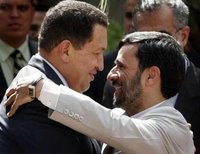

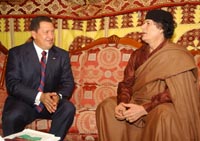
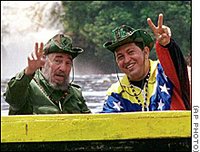
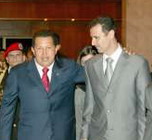
 Site feed
Site feed 